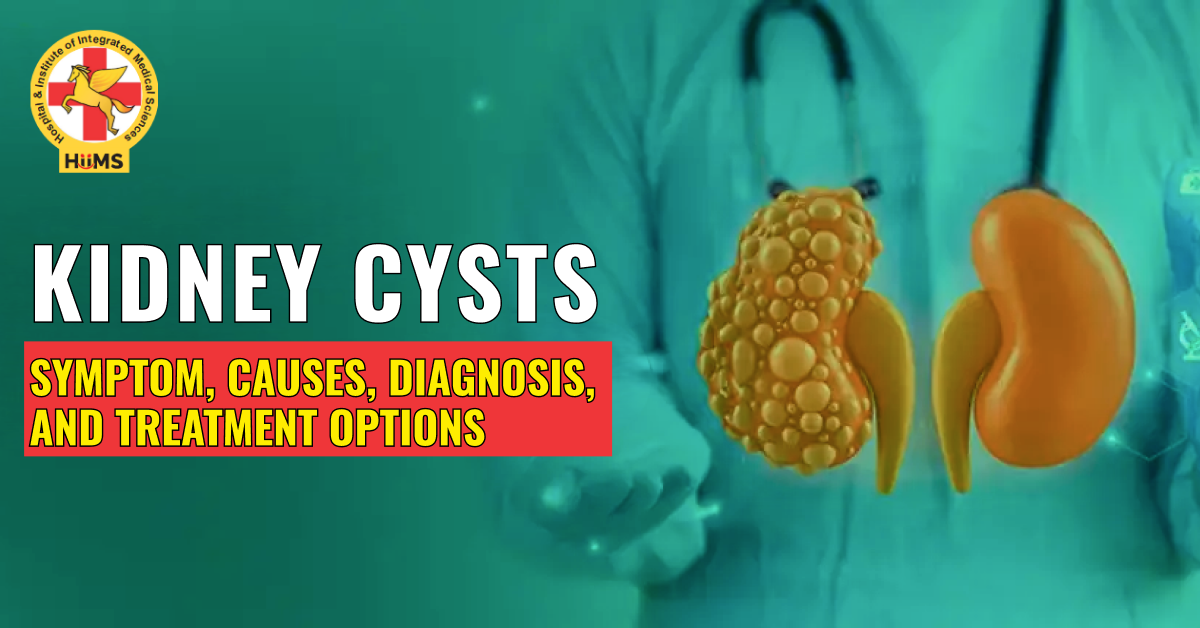Kidney cysts are a common yet sometimes ignored medical disease that many people experience. Kidney cysts are typically non-cancerous and often don’t cause noticeable symptoms, and they can develop in one or both kidneys. If left untreated, these cysts can cause health problems. Kidney-related issues, such as cysts, are becoming increasingly prevalent in today’s world due to factors like rising stress levels, poor dietary habits, and unhealthy lifestyle choices.
It’s critical to understand all of the therapy alternatives available for kidney cysts. Traditional techniques like surgery or cyst draining are frequently advised in extreme situations, but invasive procedures aren’t always necessary for kidney cyst treatment. Many people are choosing natural remedies, and kidney treatment in Ayurveda provides an integrated approach that emphasises restoring balance in the body through dietary, lifestyle, and herbal adjustments. By promoting general kidney function, this strategy can supplement conventional medical therapies and offer long-term relief.
What is a Kidney Cyst?
Kidney cysts are fluid-filled, non-cancerous sacs that develop in the kidneys. They may vary from small, almost harmless cysts to bigger ones that may be unpleasant or cause complications. The majority of kidney cysts are simple, which implies that they are usually asymptomatic and benign. However, depending on their size and location, they might occasionally result in pain or other health problems.
What are the causes of kidney cysts?
The cause of kidney cysts involves several factors that could be involved in their development:
- Age: In older persons, kidney cysts are more prevalent.
- Factors related to genetics: Multiple kidney cysts can develop in people with polycystic kidney disease (PKD), a condition that some people inherit.
- Kidney Damage: Cysts can occasionally develop as a result of prior kidney infections or trauma.
- Dialysis: They may be more prevalent in the case where a person has had dialysis for a long time.
What Are Kidney Cyst Symptoms?
Cysts typically don’t create any Kidney cyst symptoms, especially if they’re small. However, the following symptoms of kidney cysts may appear if the cysts enlarge or cause problems:
- Pain: Side or back pain, especially around the kidneys.
- Urine with Blood: Haematuria, or blood in the urine, may indicate a ruptured cyst.
- Increased Urination: More frequent urination, especially at night.
- High Blood Pressure: Kidney cysts can cause high blood pressure because they interfere with the work of the kidneys.
- Fever and Infection: In rare situations, kidney cysts may become infected, causing fever and pain.
How Do Diagnoses for Kidney Cysts Happen?
Kidney cyst diagnosis using imaging techniques to determine their presence, size, and nature. Although kidney cysts can be effectively managed and treated holistically with Ayurveda, diagnostic processes frequently depend on modern imaging technologies for accurate evaluation. Although they are not used in treatment, these diagnostic techniques are helpful in clearly diagnosing the problem.
- Ultrasound: The most popular non-invasive technique for finding kidney cysts is ultrasound. It can easily detect cysts and form a picture of the kidneys by using sound waves.
- CT Scan: By providing accurate cross-sectional images of the kidneys, a CT scan enables medical professionals to identify the number, size, and location of cysts.
- MRI: Magnetic resonance imaging (MRI) allows to get high-resolution pictures of a kidney, and it can be used to assess the renal cysts and their aftereffects.
Even though these instruments are allopathic and just used for diagnosis, Ayurvedic kidney cyst treatment, which focuses on restoring kidney health naturally and without side effects, can be utilised to treat kidney cysts.
Can Kidney Cysts Cause Pain?
The majority of kidney cysts are harmless and do not result in any long-term health issues.
- Infection: Fever, discomfort, and nausea are some signs of an infected cyst.
- Bleeding: When cysts burst, there may be considerable discomfort or bleeding.
- Reduced Kidney Function: Kidney failure occurs as the result of large cysts or many cysts that can affect the functions of the kidney.
- High Blood Pressure: Kidney cysts can occasionally impair renal function, which raises blood pressure levels.
Over time, these issues may get worse if treatment is not received. Kidney health must be closely monitored, and if symptoms develop, medical help should be sought.
What Kinds of Kidney Cyst Treatment Are Available?
Kidney cysts are treated holistically in Ayurveda with an emphasis on herbal assistance, nutritional control, detoxification, and rejuvenation. The main Ayurvedic therapeutic modalities are listed below:
-
Panchakarma Treatment (Rejuvenation & Detox)
Strong Ayurvedic remedies like Vaman, Virechan, Basti, Nasya, and Raktamokshan eliminate rooted poisons and naturally repair kidney function. A potent Ayurvedic cleansing technique that eliminates set poisons and brings the body back into balance.
- Enhances and revitalises renal function.
- Naturally balances doshas and promotes internal healing.
- Increases immunity and vitality while the body heals.
-
GRAD Therapy
At HIIMS, an innovative therapy called the GRAD System (Gravity-Aided Renal Detox) uses gravitational methods to enhance kidney health.
Head-Down Tilt Therapy (HDT)
- Involves adjusting the body’s tilt from 5° to 15°, depending on how severe the disease is.
- Particularly helpful in treating chronic renal diseases and kidney cysts.
Benefits
- Improves the flow of blood from the lower body to the kidneys.
- Regulates the hormones responsible for blood pressure and balance of fluids.
Hot Water Immersion (HWI)
- For at least half an hour, soak the body in water that is 42°C.
Benefits
- Increases renal blood circulation by widening blood channels.
- Encourages perspiration to support a natural detox.
- Enhances relaxation and lessens tension and muscle stiffness.
Is It Possible to Avoid Kidney Cysts?
Although kidney cysts cannot always be avoided, some lifestyle modifications can lower the chance of getting one:
- Healthy Diet: Consuming a well-balanced diet low in salt and high in antioxidants can help to support kidney health.
- Hydration: Drinking lots of water may lower the risk of cyst formation and maintain renal function.
- Frequent checks: Imaging tests and routine checks can help identify kidney cysts early if you are at risk for kidney issues or have a family history of kidney illness.
- Quit Smoking: Quitting smoking can help protect your kidneys because it reduces your risk of renal disease.
Join our free WhatsApp group for live webinars by Acharya Manish Ji and discover how Ayurveda can naturally support kidney healing.
✅ Expert advice
✅ Herbal remedies
✅ Live Q&A sessions
Click here to join and take your first step toward better kidney health.
Conclusion
Kidney cysts are frequent but usually benign. It’s imperative to get treatment right once the result in symptoms or consequences. Depending on how severe the Kidney cyst treatment choices might range from conservative therapy to surgery. Kidney treatment in Ayurveda and lifestyle changes to manage kidney cysts holistically.
You can successfully manage kidney cysts and avoid consequences by keeping an eye on your kidney health, leading a healthy lifestyle, and getting medical assistance when needed. For diagnosis and treatment, speak with a healthcare professional if you think you may have kidney cysts or if you show any associated symptoms.
FAQ
Q1. Which are the early symptoms of a Kidney cyst that should be tracked?
Back ache, characterised by dullness, frequent passing out of blood or traces in urine, may be the initial symptoms of kidney cysts.
Q2. Does Ayurvedic Kidney cyst treatment provide long-term relief?
Kidney treatment in Ayurveda provides holistic relief by detoxification and rejuvenation of the kidneys in a natural way.
Q3. Is it possible to do the Kidney cyst diagnosis without using invasive procedures?
Non-invasive imaging, such as ultrasound and MRI, is usually done to diagnose Kidney cysts accurately.
Q4. What complications of the kidney cyst may occur if not treated?
Failure to treat cysts can result in high blood pressure, infections or poor kidney function.
Q5. What are the natural ways of preventing kidney cysts?
Drinking enough water, following a kidney-friendly diet, and adhering to the Ayurvedic lifestyle are ways of lowering risk.



Name: Tapas Kumar Behera
Phone: 8847809357
Disease: ADPKD
Comment:
I need your help and support
Name: Tapas Kumar Behera
Phone: 8847809357
Disease: ADPKD
Comment:
I need to check with you
Name: Roberto
Phone: 3512213650
Disease: PD
Comment:
I was diagnosed with Parkinson’s disease four years ago. For over two years, I relied on prescription medications and therapies, but unfortunately, the symptoms continued to worsen. My mobility declined, tremors increased, and I experienced growing fatigue and discomfort that affected my daily life. Last year, out of desperation and hope, I decided to try an herbal treatment program from NaturePath Herbal Clinic. Honestly, I was skeptical at first, but within a few months of starting the treatment, I began to notice real changes. My energy improved, the discomfort eased, and I felt stronger and more capable in my daily life. Incredibly, I also regained much of my stamina, balance, and confidence. It’s been a life-changing experience I feel more like myself again, better than I’ve felt in years. If you or a loved one is struggling with Parkinson’s disease, I truly recommend looking into their natural approach. You can visit their website at www. naturepathherbalclinic .com
Name: Anil
Phone: 9419184927
Disease: Kidney cycst
Comment:
Simple kidney cyst for last 8 years in both
Name: Anil
Phone: 9419184927
Disease: Kidney cycst
Comment:
Simple kidney cyst for last 8 years in both